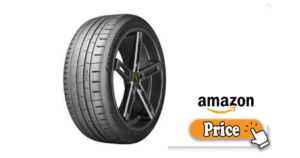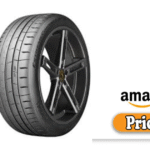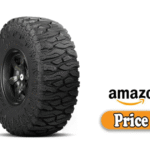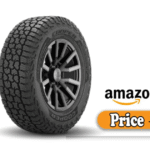When it comes to choosing tires, one name that stands tall in the automotive industry is Continental. Known for its German engineering, premium performance, and strong emphasis on safety, Continental tires often land on the shortlist for drivers seeking both quality and confidence behind the wheel.
But let’s get real, Continental tires aren’t cheap. So the big question becomes: Are Continental tires worth the price? In this article, we’ll break down exactly what you’re paying for, what makes them stand out, how they compare to other premium brands, and whether their price aligns with their value.
We’ll dive into the full experience from design and performance to real-world usage and alternative options, so by the end, you’ll have a clear understanding of whether Continental tires’ price matches their performance.
What I Like About Continental Tires
Continental isn’t just about a prestigious name; they consistently back it up with performance, innovation, and user satisfaction. Here are the standout positives:
1. Outstanding Safety Technologies
Continental invests heavily in safety innovation. Their tires frequently come with proprietary tech like:
- ContiSeal™ – Instantly seals punctures up to 5mm in diameter
- ContiSilent™ – Reduces cabin noise up to 9 dB
- Run-flat capability – Keeps you going for 50 miles after a puncture
These technologies, while contributing to a higher price point, offer peace of mind and superior driving confidence.
2. Exceptional Wet and Dry Traction
Continental consistently ranks among the top brands in both wet and dry braking performance. Their tread compounds and design geometry are engineered to deliver stable, grippy handling in all road conditions.
3. Long Tread Life with Warranty Support
Many Continental tires are backed by generous treadwear warranties up to 80,000 miles, making them a long-term investment. Models like the TrueContact Tour last for years with proper maintenance.
4. Quiet and Comfortable Ride
Even in their performance tires, Continental strikes a balance between responsiveness and road comfort. Thanks to their ContiSilent technology and optimized tread patterns, road noise is minimized.
What Could Be Better
Continental tires are impressive, but they’re not without flaws. Here are a few areas where improvement wouldn’t hurt:
1. Price Tag Can Be Steep
The most obvious downside? They’re expensive. In some categories, Continental tires can be 10–30% more costly than mid-tier competitors.
For example:
- Continental CrossContact LX25 (SUV/Touring): ~$180–$220/tire
- Continental ExtremeContact DWS 06 Plus (UHP): ~$200–$260/tire
This price premium may not make sense for drivers with light usage or basic commuter needs.
2. Limited Off-Road Options
While Continental dominates in the touring, performance, and all-season segments, their off-road lineup is minimal. If you’re driving a truck or SUV that frequently leaves pavement, you might find more rugged choices elsewhere (e.g., BFGoodrich or Falken).
3. Some Models Wear Quicker Than Expected
Though most Continental tires are long-lasting, some ultra-high-performance models (like the Sportit 6) may wear faster, especially under aggressive driving conditions. 👉🏿👉🏻 Check The Latest Price and Offer at Amazon 👈🏻👈🏿
👉🏿👉🏻 Check The Latest Price and Offer at Amazon 👈🏻👈🏿
My Personal Experience with Continental Tires
Over the last decade, I’ve had multiple vehicles equipped with Continental tires, including an SUV, a sedan, and a performance coupe. Here’s a breakdown of my real-world experience:
1. Continental TrueContact Tour – Sedan (Daily Commuter)
- Comfort: Smooth and impressively quiet on highways
- Fuel Economy: Noticed a 2–3 MPG improvement over older tires
- Wet Grip: Top-tier confidence-inspiring during downpours
- Tread Life: Lasted 70,000 miles with regular rotations
- Price Paid: ~$165/tire
- Overall Rating: 9.2/10
2. Continental CrossContact LX25 – SUV (Family Use)
- Ride Quality: Absorbs bumps well, even on broken pavement
- Noise Level: Practically silent at cruising speeds
- Winter Performance: Mild snow traction, but not for icy roads
- Price Paid: ~$190/tire
- Overall Rating: 8.7/10
3. Continental ExtremeContact DWS 06 Plus – Coupe (Performance)
- Handling: Precise and confidence-inspiring, especially cornering
- Rain Grip: Incredible feels glued to the road
- Treadwear: Moderate needed replacement at ~35,000 miles
- Price Paid: ~$240/tire
- Overall Rating: 9.5/10
In every case, I felt the premium price was justified by comfort, control, and longevity, though the upfront cost stung a little.
Design & Engineering Excellence
What sets Continental apart isn’t just the branding, it’s the engineering. Every tire is meticulously designed using cutting-edge materials and technologies.
EcoPlus+ Technology
Used in touring models, this improves fuel efficiency, extends tread life, and reduces rolling resistance without compromising grip.
SportPlus+ Technology
Integrated in their UHP tires, it enhances grip during spirited driving while still maintaining solid wet performance and decent tread life.
Temperature-Activated Polymers
These help adapt the tire compound to different weather conditions, making them ideal for year-round use in moderate climates.
ContiSeal™
A self-sealing feature in select models that instantly closes small punctures—ideal for urban drivers or long-distance commuters.
ContiSilent™
An inner foam layer that reduces road noise significantly, especially useful for luxury cars or electric vehicles.
Performance: Category-by-Category Breakdown
Let’s take a deeper dive into how Continental performs across major tire categories:
1. All-Season Touring
Best Models: TrueContact Tour, PureContact LS
Price Range: $130–$190
Performance:
- Smooth ride, excellent wet grip
- Long tread life
- Great for sedans, coupes, minivans
2. Ultra-High-Performance (UHP)
Best Models: ExtremeContact DWS 06 Plus, SportContact 7
Price Range: $180–$280
Performance:
- Superior dry & wet grip
- Tight handling and quick response
- Shorter tread life, slightly stiffer ride
3. SUV & Crossover Tires
Best Models: CrossContact LX25, TerrainContact H/T
Price Range: $160–$250
Performance:
- Quiet, composed ride
- Capable in rain and light snow
- Good for daily-driving SUVs
4. Winter Tires
Best Models: VikingContact 7, WinterContact SI
Price Range: $140–$200
Performance:
- Excellent snow and ice traction
- Soft compound for frigid temps
- Not ideal for warmer climates
Build Quality and Durability
Continental tires are engineered in Germany but manufactured globally, including in the U.S., Portugal, and Romania. Regardless of origin, quality control is strict, and durability is rarely an issue.
Sidewall Strength
Their SUV and UHP lines are reinforced to handle potholes and high-speed cornering.
Uniform Tread Wear
Thanks to advanced design simulations and testing, Continental tires often wear evenly when rotated regularly.
Puncture Resistance
While no tire is immune to flats, Continental’s construction, especially in models with ContiSeal, reduces vulnerability to sharp debris.
Alternative Options:
If you’re comparing Continental tire prices against competitors, here’s how they stack up:
| Brand | Strengths | Price Comparison |
| Michelin | Quiet ride, long tread life, premium tech | Similar pricing, sometimes higher |
| Goodyear | Innovation in all-weather tires | Slightly cheaper for some models |
| Pirelli | High performance, sports-oriented | Comparable, better on ultra-sports |
| Bridgestone | Balanced ride, strong touring models | On par with Continental |
| Falken | Budget-friendly, decent performance | 20–30% cheaper than Continental |
Bottom Line: Continental sits in the upper-middle to premium tier. You’re paying more than mid-tiHigh-performanceten, slightly less than Michelin. The trade-off is advanced tech and trusted performance.
Read More: Are Lexani Tires Any Good
Final Thoughts
Yes, if quality, safety, and performance matter to you, Continental tires are absolutely worth the price.
You’re not just paying for rubber. You’re paying for:
- Engineering precision
- Proven safety innovation
- Quiet, comfortable driving
- Long-term durability
If your priority is low cost, Continental may not be the best fit. But if you’re looking for peace of mind, refined handling, and longevity, the premium price is justifiable.
FAQs: Continental Tires Price
1. Why are Continental tires so expensive?
They integrate premium materials, advanced safety tech (like ContiSeal), and German engineering built to deliver long-lasting, high-performing tires.
2. Are there any Continental tires under $150?
Yes, models like the TrueContact Tour or WinterContact SI can be found in smaller sizes for under $150 each.
3. Do Continental tires go on sale?
Absolutely. Seasonal promotions, rebates, and bundled discounts are common, especially around spring and fall.
4. How does Continental compare to Michelin in price?
Michelin is typically 5–10% more expensive than Continental, depending on the tire type. However, both deliver premium quality.
5. Are Continental tires fuel-efficient?
Yes, especially their touring lines like the TrueContact Tour, which feature low rolling resistance for improved MPG.
6. Where are Continental tires made?
They’re produced in several locations including the U.S., Germany, Romania, and Portugal. U.S. production ensures faster delivery and quality control.
7. What’s the average lifespan of Continental tires?
Most last between 50,000 and 80,000 miles, depending on driving habits, maintenance, and model type.
8. Is there a warranty on Continental tires?
Yes, most tires include mileage warranties (up to 80,000 miles) and road hazard coverage for a limited time.




